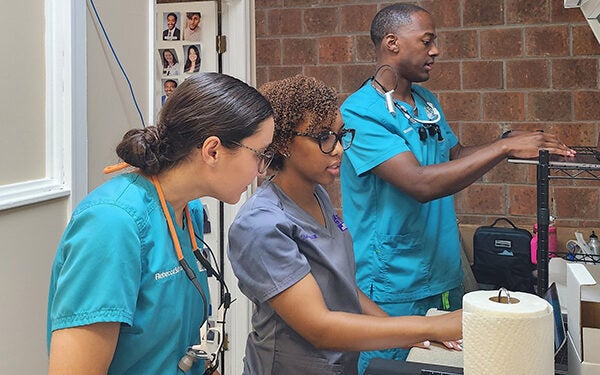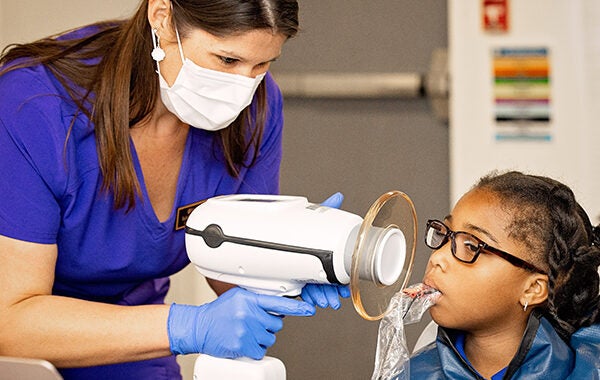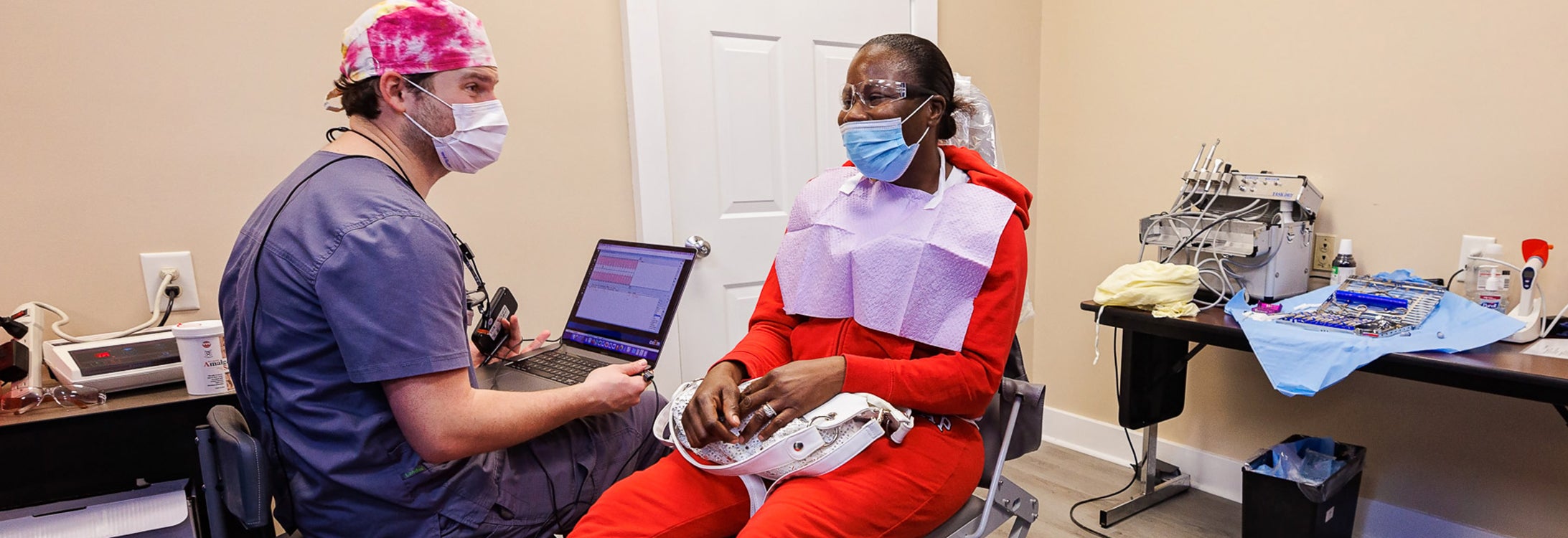Dental school county-based oral health care programs thrive
When Connie Burleson moved from Sanford, North Carolina, to Swan Quarter in coastal Hyde County, one of her favorite pastimes became driving the back roads and taking in the area’s natural beauty.
She navigates the Lake Mattamuskeet and Pamlico Sound wetlands and refuges saturated with birdlife. She passes farmland dotted with soil furrows, both fruitful and fallow.
“That’s my joy,” Burleson said, “riding around and seeing things. I’ve been here three years, and there is still always something I haven’t seen.”
One thing she and her neighbors in Hyde and surrounding counties can count on is that they, too, are being seen.
For the past two years, the School of Dental Medicine at East Carolina University has operated the Hyde County Outreach Clinic in the back of the Swan Quarter post office building. Students, residents, faculty and staff travel once a month from Greenville to care for patients in a county that currently has no practicing dentists.
Burleson has sought care at the office since day one, getting a cleaning and routine follow-up care over the years.
“It’s so nice having this so close to home,” she said, “and it’s awesome working with the students because you’re able to help with their education. All of this is helping Hyde County so much, too.”
The ECU dental school also has programs in place in Bertie and Jones counties to address oral health care in schoolchildren, creating a virtual triangle of care that encapsulates rural populations in critical need of dental care and services. These three county-based programs are making strides in reaching patients of all ages in some of North Carolina’s most underserved communities.

Students: Fourth-year dental students Rebecca Sutton, left, and Markus Mosley, right, work with ECU dental school alumna and resident Dr. Cherina Jo Belton to access patient records at the school’s Hyde County clinic in August.
(photo by Spaine Stephens)
“Our county-based programs are a testament to the dedication of our faculty, staff, students and residents to reach patients in rural areas where care is needed most,” said Dr. Greg Chadwick, dean of the ECU School of Dental Medicine. “The enthusiasm of our community partners and our patient bases also speaks volumes, validating that what we are doing is not only working, but also serves as a vital part of our school’s mission.”
Bringing smiles to Swan Quarter
Just over two years ago, a ribbon was cut and a promise was kept.
Today, the Hyde County Outreach Clinic is bustling with patients and providers. Neighbors chat with neighbors while they await their appointments — “How’s the farming?” “How’s the family?” — and seasoned dentists introduce students and residents to the challenges and rewards of rural dentistry.
In 2019, the Anonymous Trust — a philanthropic group that aims to support rural and underserved communities — provided the School of Dental Medicine a grant award of $144,000 for portable dental equipment and personnel to launch the Hyde County Outreach Clinic.
In December 2022, the Hearst Foundations — national philanthropic resources for organizations working in the fields of culture, education, health and social services — approved funding in the amount of $100,000 for the school to provide dental care to underserved, uninsured and low-income rural patients. Portable dental equipment and special patient care funds will allow the school to provide high-quality dental care to North Carolina’s most medically underserved communities, beginning with the Hyde County clinic.
On a Friday in early August, the clinic’s internet was spotty. Without a secure connection, records and images couldn’t be accessed, and the day couldn’t begin. But where there is a problem and a group of dentists, there’s always a solution; usually, it’s an out-of-the-ordinary idea that withstands trial and error. Today is no different.
“That’s how it is, doing dental care in a rural community,” said Dr. Rob Tempel, the school’s associate dean for extramural clinical practices, as he and other providers finally made the vital internet connection. “It’s great for these students to have this kind of experience solving problems.”
The experience students gain, he added, shows the level of dedication they have to serving their state now and as they graduate and embark on careers in dentistry.
“It’s incredibly fulfilling to know that the students who are selected to attend this school continue to demonstrate and grow their passion to serve rural communities,” Tempel said. “Their positive energy continually refreshes us as faculty to see them genuinely want to do it.”
Those fourth-year students are part of something so much bigger.
Once a month on a Friday, the clinic provides care for anywhere from 15 to 25 patients. Since the clinic’s creation, close to 170 unique patients have undergone cleanings and procedures, keeping them close to home and bypassing the sacrifice of time and gasoline traveling to Greenville or dental offices in other counties. More than 120 dental students have traveled to Swan Quarter to provide care. The office has become part of Hyde County’s primary care team, bridging dentistry with overall health services, a key part of the School of Dental Medicine’s mission.
Fourth-year student Sydney Lewis said the opportunity to serve Hyde County comes during a rotation in the Ross Hall Service Learning Center on campus.
“I have been anticipating being able to go to the Hyde County clinic since it was first started,” said Lewis. “I did a simple procedure on one patient that seemed small to me, but this patient told my faculty that their provider ‘must be a magician’ because their denture had not fit great in a while, but now it did. This made me so happy, and I will probably remember that forever.”
Experiences like Lewis’s help solidify trust between patient and provider.
“Engaging with the local community helps students understand the importance of building trust and rapport with patients,” said fourth-year student Markus Mosley. “This relationship is crucial in rural settings where health care providers are often integral parts of the community. Participating in community-oriented service-learning projects helps students recognize the broader social determinants of health and the importance of public health initiatives.”
To Luana Gibbs, director of the Hyde County Health Department, the clinic is a partnership that also represents combining state and local resources for the good of the residents.
“Vision, desire, support, collaboration and determination have been key,” she said. “First, there had to be the vision and desire to even attempt this type of service model, and I must give props to ECU for that. Multiple people with a passion to help our community have come together and succeeded in this partnership.”
That collaboration includes ECU undergraduate students as well.
Honors College student and public health major Aaron Mulkey has had the opportunity to observe procedures at the Hyde County clinic, shadowing providers and cementing his aspirations of dental school.
“I love the hands-on approach to helping the community,” he said. “The commitment of the ECU dental school sparks passion in my mind.”
Fellow Honors College student and aspiring dentist Melony Grace Hodges serves as coordinator of the Hyde County clinic, gaining valuable insight on the business side of a dental practice. Many of the patients already know Hodges — she grew up a stone’s throw from the clinic and is vocal about her plans to return to her roots and provide oral health care to the community that raised her.
Burleson paused in the waiting area after her appointment and watched as Hodges checked other patients in and handled bills and phone calls.
“I don’t know her very well,” Burleson said, “but I sure am proud of her.
Smiles for schoolchildren
The dental school’s School-Based Oral Health Prevention Programs also ensure that similar homegrown smiles start out early in life.
Launched in Bertie County in 2019 through a $400,000 grant from the Duke Endowment and in Jones County in 2023, the program places ECU hygienists in select schools to provide oral health care and preventive education to children. The program offers comprehensive dental exams, X-rays, cleanings, fluoride varnish application and dental sealants to all public elementary and middle school children.
The Jones County program is jointly funded by the BlueCross BlueShield of North Carolina Foundation and the Duke Endowment; in addition to planning funding, the school received a $400,000 implementation grant in late 2022. For the past two years, the Delta Dental Foundation has provided a grant to offset the cost of care for uninsured children. The Bertie program is now self-sustaining through insurance, while Jones county’s is still grant-funded. Costs are also significantly reduced by the use of teledentistry, through which hygienists in the schools can connect with dentists on campus to discuss and diagnose cases.
“Seeing the students get more confident in their smiles and actually getting problems addressed is really rewarding for all of us,” said Rachel Stewart, dental hygienist and supervisor of the School-Based Oral Health Prevention Programs.
Over time, Stewart has seen children become less apprehensive about receiving dental care, making it easier for parents to seek additional care in dental offices close to home.

Stewart: Rachel Stewart, ECU dental hygienist and supervisor of the School-Based Oral Health Prevention Programs, works with a Windsor Elementary School student near the inception of the program in Bertie County in 2019. (Photo by Cliff Hollis)
“Some of them do already have a lot of dental conditions and things going on, but we’re able to provide care in an environment where they’re already comfortable,” she said. “I think it lessens the anxiety, and now 99% of the time they’re excited.”
To date, more than 1,300 children have been served across Jones and Bertie counties, according to Stewart, including nearly 6,000 appointments during which more than 16,000 procedures were completed. Of the children served, 76% are on Medicaid — easing the challenges of patients connecting with Medicaid providers in rural counties — while 20% are uninsured and 4% have the cost of care covered privately. Most children enrolled in the programs are between 4 and 12 years old and range from kindergarten to 12th grade.
“The impact on the kids continuously grows as we are building relationships with the children, the schools, parents and community,” said Gina Hamilton, one of the school’s public health dental hygienists who cares for patients in Bertie County schools. “We are building trust and helping the children develop healthy habits.”
The School-Based Oral Health Prevention Programs are also led by dental school faculty member and principal investigator Dr. Wanda Wright, along with faculty members Drs. Michael Webb and Vanessa Pardi.
“Most dental diseases are preventable, but many children unnecessarily suffer from dental disease because of lack of access to dental services and inadequate home care,” Wright said. “Poor oral health can have a detrimental effect on children’s performance at school and on their quality of life. Ensuring that students have preventive oral health services in school is important in helping them stay healthy and ready to learn.”
Educational leaders in Bertie and Jones counties are also celebrating the strengthening collaborations.
“This partnership is totally aligned with the district’s strategic plan as we try to ensure that our students have increased academic, social and emotional outcomes,” said Dr. Otis Smallwood, superintendent of Bertie County Schools. “Research tells us that poor oral health in students could lead to decreased academic outcomes, so we are very fortunate and proud of this partnership with ECU School of Dental Medicine.”
Pardi said the programs’ benefits extend to unique clinical experiences for students and exposure to potential careers for schoolchildren. The multi-dimensional benefits of the dental school’s county-based programs not only meet the school’s mission but stand to change the lives of all those involved — from patients young and old to dental students themselves.
“Having grown up in a rural county, I’ve always felt a deep connection to these communities and knew that I wanted to give back by practicing in a similar setting, or ideally, in my hometown,” said fourth-year dental student Rebecca Sutton. “The Hyde County clinic provided me with my first experience providing care in a rural area, which was profoundly rewarding and solidified my passion for serving the place that shaped me.”
